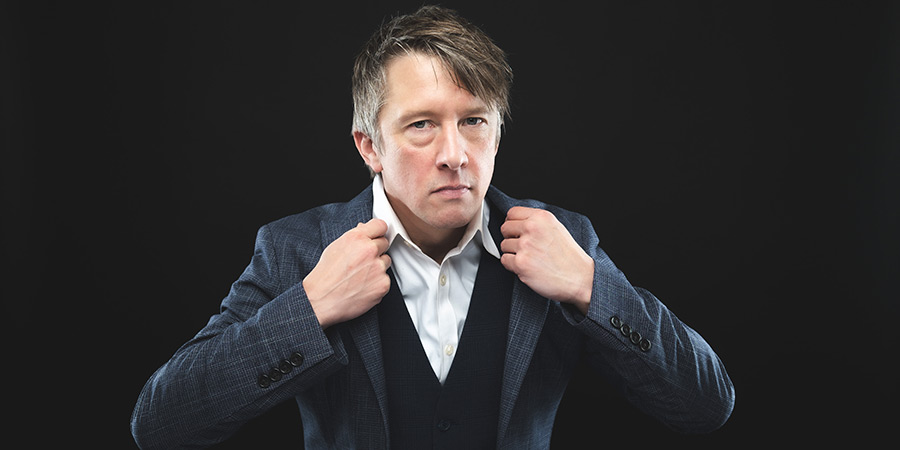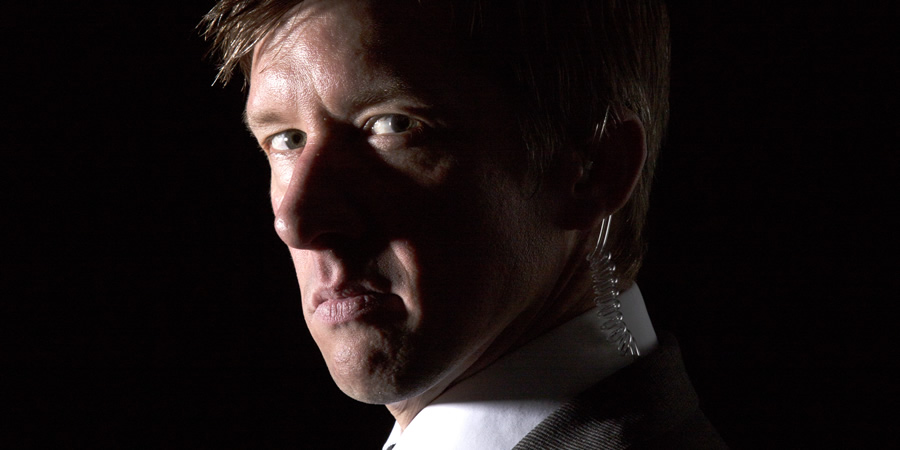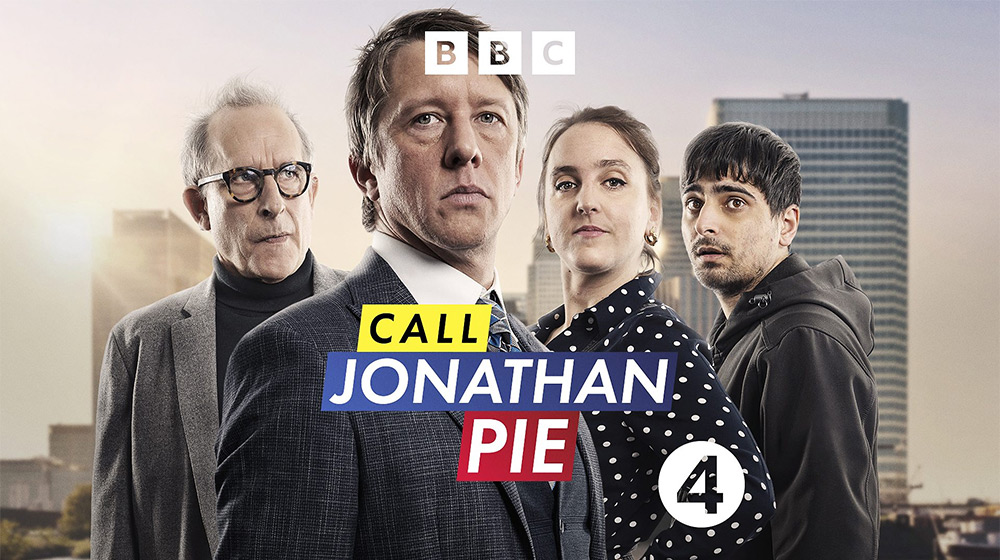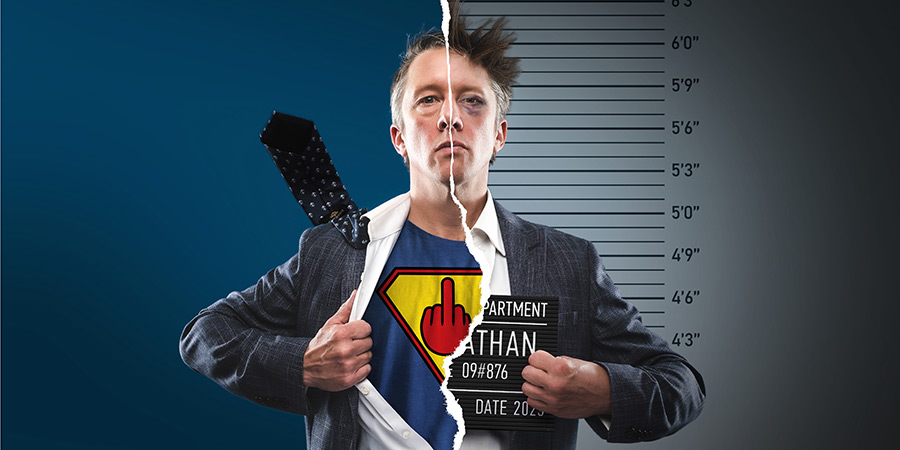Creating a character: Tom Walker on Jonathan Pie

Jonathan Pie: Heroes and Villains will be playing at the Duke of York's Theatre in the West End later this month for a 2-week residency. Recently, we had the chance to talk with Tom Walker, who plays the iconic newsman. We discussed the creation of Jonathan Pie, and what Walker hopes audiences take away from the show as a whole.
So for those unfamiliar with the character, can you tell us a bit about Jonathan Pie?
Jonathan Pie is the angry news reporter that says what he really thinks between tapes. He'll finish his piece to camera, and then he'll go off on one about the state of the country. It's been going on for about seven years - I'd find it very weird if you hadn't come across him once! But yeah, he's the guy that's shouting.
And what inspired you to create him?
Basically, I was an out-of-work actor for about 20 years and finally decided to make my own work. And I'd always had this idea of, "What does the news reporter say between takes?". When it first started, I didn't think that it would be a political satire! I thought it would be more broadly comic, more situation comedy. But the first couple I did happened to be political and I realised that that's what people were tuning in for. So that's the way I went with it. I am accidentally this political satirist. I didn't even mean to be a comedian! It was just a character study, and now I'm touring as a stand-up-character-comedy-political-satirist. Very, very weird.
What is the creative process like for coming up with a character like Jonathan Pie?
It depends what it is! If it's the material that I put out as online content, then that can be a pretty quick turnaround. Something's happened in the news, I'll sit down for a day and write something and then the next day film it. It's what I would call disposable content. It's here today, gone tomorrow - no one's gonna listen to that thing I did about Liz Truss leaving office again, because it's just not relevant.
But when I'm sitting down to write a live show, I want that to have a little bit of longevity. Not only because the tour lasts three months, or whatever it does, so 90% of it needs to stay relevant, and then you can switch little bits of it in and out. But you want it to be something that in a year's time, if you film it, you can go back and watch it and it still feels relevant. So it needs to be about something slightly more than just what's going on in Westminster.
When I'm not in the thick of a big project, if something comes to mind, a funny line, a funny situation or just a little chunk of something, I will write it down and always put it somewhere, which means when I come to sit down to write a show, it's not a blank page, I've got all of this junk and all of these little jokes.
But then, from the live show process, you've got to have a structure that you can hang all these set pieces onto. He [Pie] has to leave the stage in a different state to how he came onto the stage - something needs to have happened to him. There needs to be a story. So very early, you work out what those beats are.

You normally try and work to a three-act structure, even though it's one act. There needs to be a midpoint where things turn, and either the tables turn on him or the tables turn on the audience. Once you've got that structure in place, that should be solid enough for there to be a change of government, or for Rishi Sunak to suddenly resign, and you still structurally got the same show. It happened during Covid. I was just near the end of the tour, then Covid hit. Then, two years later, I took the same show back on tour, but obviously a lot had changed. Structurally, the show was the same, but I jettisoned certain set pieces and rewrote it for a post-pandemic world, and that worked really well. So structure is everything when you're looking at writing what is essentially an hour and 20-minute monologue. That's the way I see it. I don't really see it as a stand-up set. I see it as a one-act play that I have to perform and learn.
And how did you come up with the structure for this show, Heroes & Villains?
Well, without giving too much away, there were a couple of starting points. Years ago, when I was doing my GCSEs, I did Media Studies. My GCSE Media Studies project was me reading the news, and I thought, "What a weird parallel that I ended up playing a news reporter!" Even when I was 15, I already had this germ in my head that I wanted to read the news. And I thought, "If I can find that video, that would be a great starting point." I tried to find that video when I started writing my last show, and I couldn't find it! I thought my dad had thrown it out. Anyway, about eight months ago, I bumped into an old friend and he went, "I got a video of you that I found, and it's you reading the news." Oh, my God, we found this video of me reading the news age fifteen - this is too juicy for me not to include! So that was one of the starting points.
And then the other starting point was I did a podcast for BBC Sounds last year [the sitcom Call Jonathan Pie], which has been really successful. There were a couple of plot points running through the show and one of those was about him trying to debate whether to send his son to a private school. I never really resolved that in the show, quite deliberately. But I thought that's a really good starting point about him having this moral dilemma, this old school left-wing socialist who would hate anyone who's had that sort of privilege. But when it comes to your own kids, it's not quite the same. And that was the germ of the idea. What if Pie is confronting all of his middle-class, champagne, socialist hypocrisies whilst calling out the hypocrisy of the government? What if those clash? So those were starting points with which I began the show.

Normally with the show, I always really try and give it as much balanced politically as I can. Obviously, he's an old-school lefty. Obviously, he hates the Tories. But there's always a bit of balance. But with this show, I thought this is likely to be the last show, if the polls are right, certainly for five years, probably for ten, of me doing a live tour with the Tory government. Therefore, I let myself off the hook - let's go for it. Let's really look back at the fourteen years of chaos that we've had and allow myself that indulgence of not always having to give it a complete balance. I can really go for what's happened over the fourteen years. So there were these three points. I'm going to let myself off the hook. You don't have to go have to have a go at all the lefties. That was where it began, and now there's a whole show of those elements.
What is the political research process like for your shows? How do you go about picking what to discuss?
When I started, I was very regular with putting content out online - I would do something every week. Therefore, you'd have to search for something. There's so much, you pick a topic this week. I don't put out anywhere near that amount of online content these days, and I think the content is better. Sometimes, less is more. And it has to be something that interests me! I understand that there is a catharsis in listening to Jonathan Pie because you've been going around for two days going, "I can't believe that politician said this". And then suddenly appearing on your Twitter or your Facebook is this guy ranting and saying exactly what you've been thinking, but he's articulated it in sort of a much more elegantly sweary way. So normally now, it's something that's hooked me in that respect, I've been walking around for a day going, "I can't believe it! I'm gonna vent it."
But obviously, I read the news every day as most people do in one way, shape or form. But I find the weekly periodicals really interesting. And what's really important is that you have to read from both sides of the spectrum. So if we were talking a daily newspaper, you'd read The Guardian, and The Telegraph, although The Telegraph is dogshit. I'd prefer The Times, actually! [Laughs] But with a weekly periodical you read the New Statesman one week, and then you read The Economist the next week. And there's a really good one called The Week, which sums up all of the week's news. So those are really interesting - I find I read those quite a lot.
So just reading proper journalism, but also reading proper journalism that you disagree with - that's really important. My dad reads The Telegraph, so whenever I go and visit my dad, I get the joy of reading The Telegraph. And I love it when there's a Daily Mail left on a train, it's like, "Oh, that's why people vote the way they do!" And also, you got to remember The Sun and the Daily Mail are the two most-read newspapers in the country. So that's what most people are reading. And you might disagree with what their political bent is, but you have to understand why people are voting the way they do and what most people are reading.

What is it like performing this show, particularly this year with the elections going on in the UK and the States?
It's terrifying! I'm out of the woods! Three or four days ago, there was a date in my diary, whereby I'd written down "Rishi Sunak can call a general election, and I don't have to rewrite the show." And it has been a real concern ever since I started writing this show seven or eight months ago. You go, "If Keir Starmer becomes Prime Minister, that's a problem for me during the tour! I have to rewrite the whole show!" The whole premise of the show is about looking back and that becomes suddenly very old if you don't have a Tory government anymore. It suddenly feels ancient.
It happened to me with the first tour. When I wrote it, was all about how awful David Cameron and George Osborne were - they were the villains of the piece. And by the end of that tour, Cameron was gone, we'd left the EU and Trump was President. I had to continually rewrite the show and that was a nightmare! So it has been a real a real concern in that respect. But, on the other hand, I think people are starting to crank up towards the US election, which is a rematch of the two most ancient and demonstrably unfit people for office that I've ever witnessed, in totally different ways. Neither of them inspire a huge amount of joy in the way that Obama did, or anything like that. Trump . . . People adore him. I don't think Biden's got that hardcore base. Personally, I think Trump will take the White House, but we'll see.
Me too, unfortunately!
Yeah, I can't see how he doesn't. With this upcoming election, I think it is an exciting prospect. There are a lot of people who have never known anything in their adult life other than a Tory government. And I don't buy this idea of, "They're all the bloody same." I do think we have a choice in this upcoming election. I do think Starmer and Sunak are demonstrably different prospects for the future of the country. Yes, Starmer isn't as left wing as a lot of people would like, by any stretch - he's clearly a centrist. But he's not a hedge fund manager like Rishi Sunak is, and I know exactly where I'll be putting my cross on my ballot paper. There's no contest, in my view. But it's a good time to be touring a political satire show, definitely. This is the biggest year for democracy the world has ever seen. Half of the world's population go to the polls this year, which has never happened before. Although a lot of those places are places like Russia. That wasn't exactly a democratic election, but it purported to be. I think there's a lot of fun to be had with that idea. But it's a good time to be touring a political show, because in a year's time, all of those elections will have happened and therefore the interest might have dipped, so I'm getting in there quickly before it all kicks off!
Do you find that you get political hecklers at your shows a lot?
I think most people know what they're letting themselves in for. I've had a few walkouts, but I don't quite know what they were expecting, to be honest!
I find hecklers my worst nightmare. And normally, my hecklers are what I call "helpful hecklers". They think they're helping by shouting out. I had one the other day of someone shouting out about nurses' pay and how terrible nurses' pay was. And I agree with them, but they completely sabotaged the show. I had to restart - I've never had to do that in my life! And I'm restarting the show because someone's shouting out about some social injustice. I get it, but they're not a political rally, it is a comedy show.
I've rarely had someone shouting negative hackles at me, but a positive heckle is just as disruptive and potentially sabotages a show, and there's not a huge amount you can do. Because of what Pie is, a lot of it is this machine gun fire rhetoric, for want of a better word, and it's quite a technical exercise. I really have to concentrate at certain sections because he doesn't stop for breath for three or four minutes. As long as I'm concentrating, I can ride over a heckle, but sometimes one just completely stalls me and I don't know where I am. So I hate hecklers, even if they think they're helping. I'd rather have a quiet Tuesday night with people politely applauding than a rowdy Saturday night, which most comedians would say the opposite!

What do you hope audiences take away from Jonathan Pie: Heroes & Villains?
Well, I hope they take away that that was a great night out! That's first and foremost. I always try and write the show assuming that half the audience are uber fans, and half the audience have been bought along by their partner who's an uber fan, and the partner's sat there going, "I'm not going to enjoy this". So you have to win them over before you win your fans over because they've already been won over, right? You've got to make it funnier than people expect, you've got to make it more interesting than people expect, you've got to just make it hopefully better than people expect.
On top of that, you want people to walk away going, "Yeah, I hate the Tories, but maybe I need to check my own behaviour sometimes". You want to challenge the audience sometimes. You want to hold a mirror up to them as well. You don't want it to just be an hour and twenty minutes echo chamber of going 'yes'. It's a stupid ley line - "I agreed the hell out of it!" You want a little bit of that, but you also want people going, "Ooh, I wasn't sure about that." You want them to have laughed a lot, but then you want them to go to the pub and talk about it for an hour. So a little bit of everything. But mainly, you want people to be giggling the next day. It's mainly a comedy piece, I hope!
Help us publish more great content by becoming a BCG Supporter. You'll be backing our mission to champion, celebrate and promote British comedy in all its forms: past, present and future.
We understand times are tough, but if you believe in the power of laughter we'd be honoured to have you join us. Advertising doesn't cover our costs, so every single donation matters and is put to good use. Thank you.
Love comedy? Find out more
